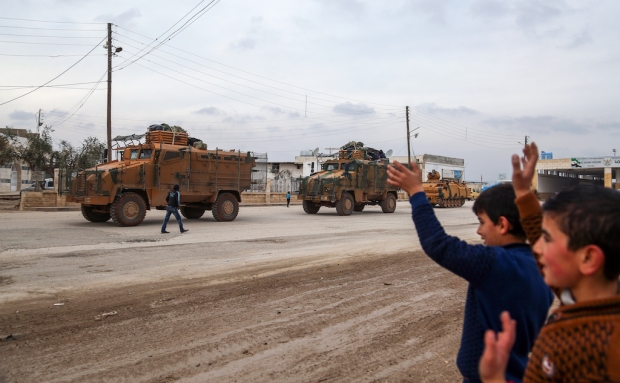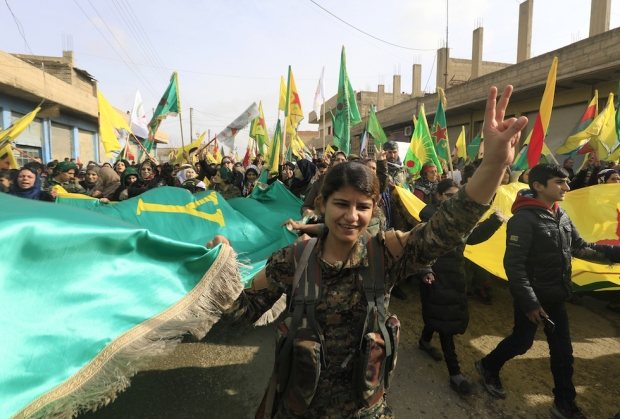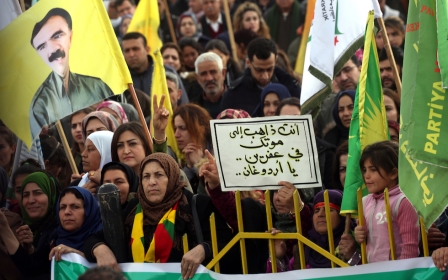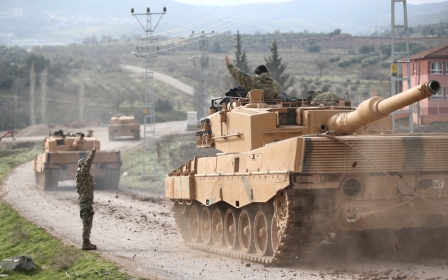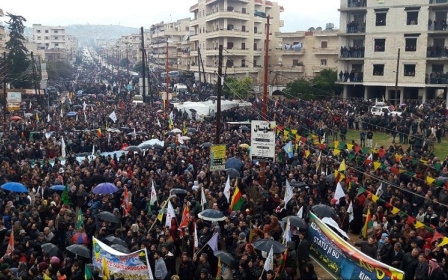Pro-Kurdish forces condemn Russian 'betrayal' over Afrin offensive
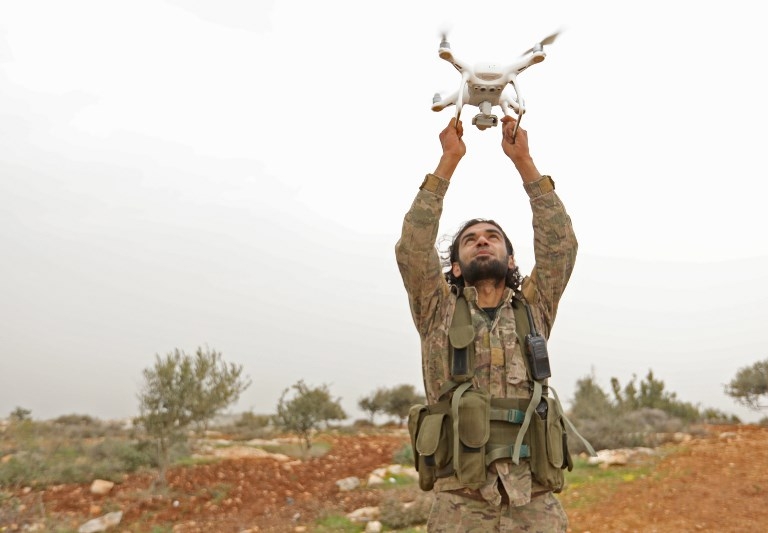
Pro-Kurdish forces in northern Syria denounced Russia's "betrayal" on Monday as clashes continued between the People's Protection Units (YPG) and Turkish forces in Afrin.
Turkish military sources announced on Monday that their forces had recaptured 11 villages in the region, as the civilian death toll from the operation reached 21 people, including six children, according to the Syrian Observatory on Human Rights.
A Turkish soldier was also killed in clashes in near Afrin in Turkey's border province of Kilis, the Turkish Armed Forces said in a statement on Monday.
'We had certain arrangements with Russia. But Russia suddenly disregarded these agreements and betrayed us. They have clearly sold us out'
- Sipan Hemo, YPG commander
Turkish artillery were firing shells on YPG targets inside Syria as ground troops opened a new front by moving on Afrin from the town of Azaz to the east, state media said.
YPG leaders have been enraged by the apparent willingness of Russia - which had scores of military advisors in Afrin - to allow Turkey to use Syrian airspace and send troops into the province.
In a statement released on the pro-Kurdish Firat News Agency website, YPG commander Sipan Hemo warned that Russia would "apologise" for abandoning the YPG-controlled enclave to Turkey and its Syrian proxies.
"For two years, Russian forces have been in Afrin, and they have claimed that they will resolve certain issues working together with Kurds," he said.
"They constantly said a solution without Kurds is not possible. We had certain arrangements with Russia. But Russia suddenly disregarded these agreements and betrayed us.
"They have clearly sold us out."
Although both Russia and the US have been critical of the operation, there have been no moves to support their one-time allies, which have been involved in fighting the Islamic State (IS) group as part of the Syrian Democratic Forces (SDF).
On Sunday, the Telegram account of Jaysh al-Thuwwar, the largely Arab militia that is one of the main allies of the YPG, released a message saying it had changed sides and was now supporting the Turkish forces.
But on Monday, a spokesperson for the group said their account had been hacked and any reports of defection were "fabrications".
"Statements made on our behalf are counter activities of the enemy and are nothing but a lie," said Heci Ahmed, a commander with the group.
"They actually need such lies. They want to give morale to their side and demoralise our people.”
The fighting has seen an array of propaganda released on both sides, with little space for independent verification of the events on the ground.
Both sides have claimed that the other is working with IS. The YPG have long accused Turkey of providing military and financial support to the group, while one unnamed Turkish official on Monday claimed that the YPG had been releasing imprisoned IS fighters to use as suicide bombers.
The SDF, who are still involved in mopping up the last pockets of IS with US support in other parts of Syria, threatened to send reinforcements to Afrin on Monday.
“We are in the framework of looking at the possibility of sending more military forces to Afrin,” SDF spokesman Kino Gabriel said in a televised news conference, while also calling for international efforts to halt the Turkish attack.
'No step back'
The operation in Afrin is a crucial one for Turkish President Recep Tayyip Erdogan, coming ahead of a 2019 general election that could see the president elected to a new "super-presidency" following the successful 2017 constitutional referendum.
The ruling Justice and Development party (AKP) have announced an electoral alliance with the far-right Nationalist Movement Party (MHP) and Erdogan has been at pains to shore up the nationalist contingent in Turkey.
On Monday, Erdogan told reporters that there would be no retreat in Afrin.
"We are determined. Afrin will be sorted out. We will take no step back. We spoke about this with our Russian friends. We have an agreement," Erdogan told a televised meeting in Ankara.
A green light from Russia, which has a military presence in northern Syria, is seen as crucial in ensuring the operation is a success. Moscow has not confirmed the existence of such an agreement.
Erdogan confirmed that Turkey had spoken with other powers, including the United States, about the operation but admitted "we couldn't convince the US on some things". He did not give further details.
"We as Turkey have no intention to occupy anywhere. We have one single goal - to win hearts," said Erdogan.
The White House on Monday urged Turkey to avoid escalation, warning that the campaign risked exacerbating a humanitarian crisis and disrupting what had been a stable area.
"We urge Turkey to exercise restraint in its military actions and rhetoric, ensure that its operations are limited in scope and duration, ensure humanitarian aid continues and avoid civilian casualties," White House spokeswoman Sarah Sanders said a briefing.
The Turkish president had expressed impatience with demands, including from some officials in Washington, to set a clear timetable for the length of the operation.
Erdogan said the operation would be over "when the target is achieved".
"How long have you been in Afghanistan? Is that over in Iraq?" he said, referring to the current US military presence in those countries which began with 2001 and 2003 invasions.
"There is no maths in such a war. How dare you ask us? We will stay as long as we need, we have no interest in staying there, we know when we will leave."
- Additional reporting by AFP
New MEE newsletter: Jerusalem Dispatch
Sign up to get the latest insights and analysis on Israel-Palestine, alongside Turkey Unpacked and other MEE newsletters
Middle East Eye delivers independent and unrivalled coverage and analysis of the Middle East, North Africa and beyond. To learn more about republishing this content and the associated fees, please fill out this form. More about MEE can be found here.


